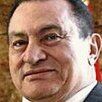
Hezbollah’s Success Hurts Egypt’s Mubarak
Egypt’s president, already at odds with his people as popular support among Egyptians for Islamist radicalism grows, was thrown an “unwelcome surprise” by Hezbollah’s success against Israel earlier this summer, according to the Jamestown Foundation’s Global Terrorism Analysis.
The Muslim Brotherhood, a long-time radical Islamist group based in Egypt that has enjoyed resurging support in recent years, was among the supporters that staged public demonstrations supporting Hezbollah’s campaign against Israel. In Egyptian mosques, worshipers heard sermons with messages like “God give victory to Hezbollah, and inflict defeat on the Jews.” Author Andrew McGregor wrote,
By July 21, a broad mix of Egypt’s opposition, including the Muslim Brotherhood, Nasserists and the political left, was represented in a mass protest. Proclaiming solidarity with Hamas and Hezbollah, the protesters targeted President Mubarak and his son Gamal before Egyptian security forces waded in with sticks and batons (al-Ahram Weekly, July 27-August 2). Similar demonstrations occurred in Alexandria, Assyut and elsewhere. Newspaper articles criticizing Egypt’s response to the conflict appeared daily in the once-submissive Egyptian press, and the Egyptian Press Syndicate organized a series of pro-Hezbollah events.
At the beginning of the Israeli-Hezbollah war, Mubarak was one of several Arab leaders who condemned Hezbollah’s actions. McGregor notes, however, that as the chorus of popular support grew larger and more passionate, Mubarak backed off:
Months before the war started, Mubarak made clear his suspicions of Arab Shiites, declaring in a television interview that their loyalties were to Iran rather than to their native states (al-Arabiya, April 8). As the battle in Lebanon continued, the government’s attitude toward Hezbollah, deeply at odds with popular opinion, began to change. Hezbollah was recognized as an integral part of the Lebanese social and political structure and the victim of a “disproportionate response” by Israel. By early August, Mubarak was denouncing Israel’s “deluded” actions in Lebanon and the “failed” Middle East policies of the United States.
McGregor characterized the support among Egyptians for the Lebanese-based, Iran-supported terrorist group this way:
Popular Egyptian support for Hezbollah would be a given, except for the traditional Sunni scorn for Shiite Islam. … [B]ut Arab nationalism is also a potent force in Egypt, and the stubborn resistance offered by Hezbollah’s small Shiite guerrilla force gained support from large parts of the population.
The Muslim Brotherhood’s solidarity with Hezbollah was clear from the beginning of the conflict:
The leader of the Muslim Brotherhood, Muhammad Mahdi Akef, announced that the organization was prepared to recruit and send 10,000 members to combat Israel, hearkening back to 1947-48 when guerrilla formations of Egyptian Muslim Brothers fought in the front lines against Israel. … The Brotherhood called on all Muslims to offer material and religious support to Hezbollah ….
But perhaps the most chilling revelation in the Jamestown Foundation report was this (emphasis ours):
Akef suggested that the Arab leaders [such as Mubarak] were bigger threats to the Arab world than Israel, and that the Brotherhood had only refrained from killing them because they were Muslims (afp, August 27).
How long will such “restraint” last, if such radicals consider their secularist Arab leader such an obstacle to radical Islamist goals? Egyptian politics have been rocked before when similar sentiments exploded into violent actions.
Despite being an officially banned organization, the Muslim Brotherhood made notable gains in Egypt’s parliament in the last parliamentary election, and is now the largest opposition bloc in the legislature. Clearly Mubarak feels its hot breath on his neck as he prepares to gift his office to his son Gamal. McGregor concluded:
Given the United States’ unwavering support for Israel’s “battle against terrorism,” it is plain that Mubarak wants to avoid any action or statement that might antagonize his U.S. patrons, whose financial and military aid is essential to the survival of the regime. The Egyptian government also has serious concerns about the growing influence of Iran in the Middle East, particularly in the form of militant groups like Hezbollah, whose political unorthodoxy threatens the region’s stable (if not stagnant) Arab regimes. The emergence of a “Shiite bloc” through Iran, Iraq and Lebanon would pose a threat to Egypt’s traditional leadership role in the Muslim Middle East.
For many years the Trumpet has voiced its expectation that Egypt will end up allying itself with the radical Shiite crescent led by Iran, which sponsors Hezbollah (see articles here and here). For this alliance to take place would require an end to the “moderate” politics of Mubarak. Demands for just such an end continue to increase, and may well end in an assassination or coup, particularly if the country does end up with Gamal Mubarak at the helm this coming year, artificially extending the Mubarak era beyond what the radicals are willing to take.
Continue to watch Egypt for more evidence of radicalization, and for an event—perhaps even violent—that marks the end of the present era of relative stability in Egyptian politics and the beginning of a new era, decidedly more extreme.
